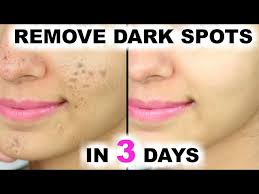Dark spots, also known as hyperpigmentation, are one of the most common skin concerns faced by both men and women across all age groups. These spots often appear as patches or marks that are darker than the surrounding skin, making the complexion appear uneven. They can result from various factors such as sun exposure, acne scars, hormonal changes, aging, or even certain medications. While dark spots are usually harmless, many people seek ways to minimize or remove them for clearer, healthier-looking skin.
This article provides a complete guide on how to reduce dark spots, including natural remedies, over-the-counter solutions, professional treatments, and preventive measures.

Understanding Dark Spots and Their Causes
Before addressing how to reduce them, it’s important to understand what causes dark spots:
- Sun Exposure (UV Rays): Ultraviolet (UV) rays from the sun trigger the production of melanin, the pigment responsible for skin color. Prolonged exposure can lead to sunspots or age spots.
- Post-Inflammatory Hyperpigmentation (PIH): Acne breakouts, cuts, or burns can leave behind dark marks after healing.
- Hormonal Changes: Pregnancy, birth control pills, or hormonal imbalances can cause melasma, which appears as brown patches.
- Aging: As skin ages, cell turnover slows, increasing the chance of uneven pigmentation.
- Medications and Skin Conditions: Certain drugs, like chemotherapy or antibiotics, can cause pigmentation as a side effect.

Natural Home Remedies for Dark Spots
Many people prefer natural remedies because they are affordable and often free from harsh chemicals. Here are some proven options:
1. Aloe Vera
Aloe vera contains aloin, a natural depigmenting compound that lightens dark spots.
- Apply fresh aloe vera gel to dark areas at night.
- Leave it on overnight and wash in the morning.
- Regular use can gradually lighten spots.
2. Lemon Juice
Rich in vitamin C, lemon juice works as a natural bleaching agent.
- Apply diluted lemon juice with water on affected areas.
- Leave for 10 minutes before rinsing.
- Use with caution, as it can make skin more sensitive to sunlight.
3. Turmeric
Turmeric contains curcumin, an antioxidant that reduces excess melanin.
- Mix turmeric with honey or milk to make a paste.
- Apply on dark spots for 15 minutes, then rinse off.
4. Apple Cider Vinegar
Acetic acid in apple cider vinegar helps lighten pigmentation.
- Mix equal parts vinegar and water.
- Dab onto dark spots using a cotton ball.
- Rinse after a few minutes.
5. Green Tea Extract
Green tea has anti-inflammatory and antioxidant properties.
- Steep a green tea bag in hot water, let it cool, and apply to the skin.
- Alternatively, use skincare products containing green tea extract.
6. Potato Slices
Potatoes contain catecholase enzymes, which can brighten skin.
- Rub raw potato slices directly on dark spots.
- Repeat daily for visible results.

Over-the-Counter Solutions
Several skincare ingredients are scientifically proven to fade dark spots. When shopping for products, look for the following:
1. Vitamin C
- Brightens skin and reduces melanin production.
- Available in serums and creams.
2. Niacinamide (Vitamin B3)
- Reduces pigmentation and improves skin barrier.
- Works well for sensitive skin.
3. Retinoids (Retinol, Tretinoin)
- Accelerates cell turnover and fades pigmentation.
- Best applied at night, followed by sunscreen in the morning.
4. Alpha Hydroxy Acids (AHAs) and Beta Hydroxy Acids (BHAs)
- AHAs (glycolic, lactic acid) exfoliate the skin, removing pigmented cells.
- BHAs (salicylic acid) penetrate pores, helping with acne-related dark spots.
5. Hydroquinone
- A powerful skin-lightening agent that reduces melanin production.
- Should be used with medical guidance, as prolonged use can cause side effects.
Table of Contents
Professional Treatments for Stubborn Dark Spots
When home remedies and over-the-counter solutions don’t work, dermatologists can provide more intensive treatments:
1. Chemical Peels
- Use stronger acids to exfoliate and remove pigmented layers.
- Effective for sunspots, melasma, and acne scars.
2. Microdermabrasion
- A non-invasive treatment that exfoliates the outer skin.
- Reduces mild hyperpigmentation and improves overall skin texture.
3. Laser Therapy
- Targets pigmentation with high-energy light beams.
- Breaks down melanin for a clearer complexion.
4. Microneedling
- Tiny needles create micro-injuries that stimulate collagen and cell turnover.
- Helps fade pigmentation over time.
5. Cryotherapy
- Liquid nitrogen freezes dark spots, causing them to peel off.
- Mostly used for age spots and sun damage.
Lifestyle Habits to Prevent and Manage Dark Spots
Prevention plays a huge role in controlling dark spots. Here are some lifestyle tips:
1. Always Wear Sunscreen
- Use broad-spectrum SPF 30 or higher daily.
- Reapply every 2–3 hours, especially outdoors.
2. Avoid Picking at Pimples
- Picking leads to post-inflammatory hyperpigmentation.
- Treat acne with proper skincare instead.

3. Healthy Diet
- Eat foods rich in antioxidants like vitamin C (citrus fruits), vitamin E (nuts, seeds), and omega-3 fatty acids (fish, flaxseeds).
- Stay hydrated for healthier skin regeneration.
4. Consistent Skincare Routine
- Cleanse, moisturize, and protect your skin daily.
- Consistency is key to long-term improvement.
5. Manage Stress and Hormones
- Stress can trigger acne and hormonal imbalances.
- Practice relaxation techniques like yoga, meditation, or exercise.
Myths About Dark Spots
It’s important to separate fact from fiction when dealing with hyperpigmentation:
- Myth: Toothpaste can reduce dark spots.
- Fact: Toothpaste contains harsh chemicals that can irritate skin and worsen spots.
- Myth: Dark spots disappear overnight with remedies.
- Fact: It takes weeks or months of consistent care to notice visible improvement.
- Myth: Only women get dark spots.
- Fact: Men also experience pigmentation due to sun exposure, shaving, or acne.
When to See a Dermatologist
While most dark spots are harmless, sometimes they may resemble serious skin conditions such as melanoma (skin cancer). Consult a dermatologist if:
- A dark spot changes in shape, size, or color.
- It becomes itchy, painful, or bleeds.
- Home remedies and products don’t show results after several months.
Conclusion
Dark spots are a common skin concern, but with the right care, they can be significantly reduced or even eliminated. From natural remedies like aloe vera and turmeric to advanced dermatological treatments such as chemical peels and laser therapy, there are multiple ways to address this issue. However, prevention remains the most effective strategy—protecting your skin from sun exposure and maintaining a healthy lifestyle will not only help fade existing spots but also prevent new ones from appearing.
Clear, radiant skin requires patience and consistency. Whether you opt for home remedies, over-the-counter products, or professional treatments, remember that results take time. With dedication, you can achieve an even-toned, glowing complexion free from stubborn dark spots.
